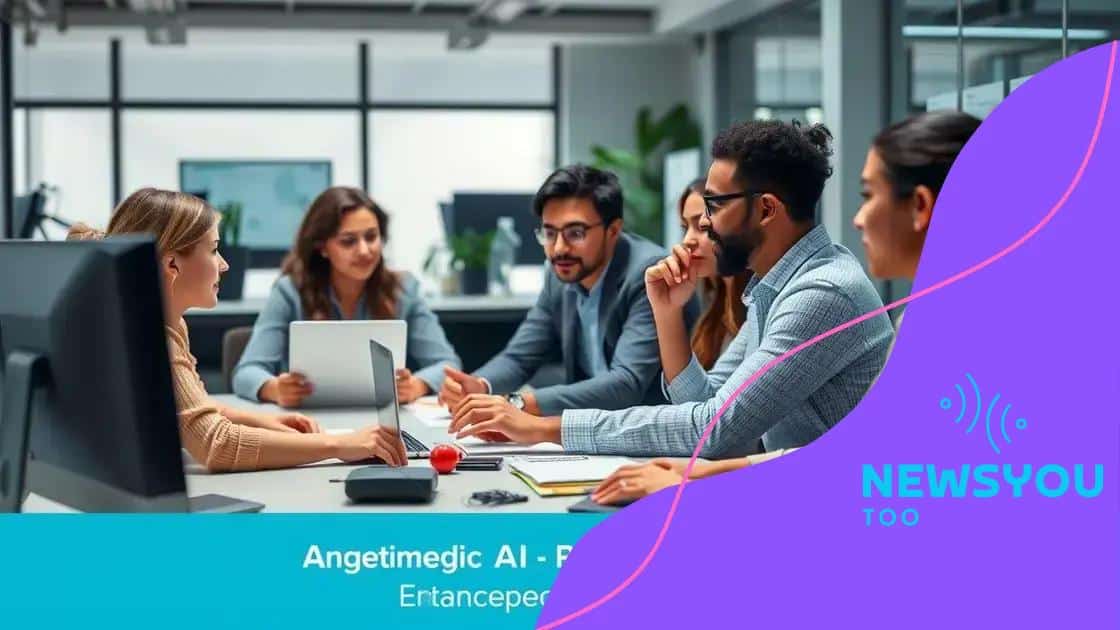Agentic AI automates workplace tasks effectively

Anúncios
Agentic AI automates workplace tasks, enhancing productivity and efficiency by minimizing manual work, improving data analysis, and integrating seamlessly with existing systems, while also requiring careful attention to challenges like cost and data privacy.
Agentic AI automates workplace tasks, making our lives significantly easier. Have you ever thought about how much time you could save by introducing smart automation into your workflow? In this article, we’ll dive into its benefits and practical applications.
Anúncios
Understanding agentic AI and its impact
Understanding agentic AI is crucial for grasping how it reshapes our work environments. This innovative technology enables systems to perform tasks independently, making workplaces more efficient and adaptable.
The impact of agentic AI on organizations can be profound. Let’s delve into its mechanisms, the way it operates, and the changes it brings to various industries.
How agentic AI works
Agentic AI relies on algorithms and machine learning. These systems analyze vast amounts of data, learning from patterns over time. They can automate repetitive tasks and offer insights that help teams make better decisions.
Anúncios
Key benefits of agentic AI
- Increases efficiency by reducing manual labor.
- Enhances decision-making with data-driven insights.
- Improves employee satisfaction through task automation.
- Offers scalability for growing businesses.
Moreover, businesses that adopt agentic AI can respond quickly to market changes. By leveraging real-time data, these organizations become more agile and competitive. The impact extends beyond productivity; it also influences employee roles and company culture.
As agentic AI takes over routine tasks, employees can focus on more strategic activities. This shift encourages creativity and innovation within teams. Engagement levels often rise as employees find more meaningful work.
In summary, understanding agentic AI is vital for organizations looking to thrive in the modern workplace. Its ability to automate tasks and provide insights is transforming traditional work practices, paving the way for a more efficient future.
Key benefits of automating workplace tasks
Key benefits of automating workplace tasks are significant and help transform daily operations. Automation leads to improved efficiency, freeing up employees to focus on higher-value work.
Automating routine tasks reduces the likelihood of human error, which can be costly and time-consuming. It streamlines processes, making tasks faster and more reliable. With automation, businesses can ensure a more consistent output, which can lead to increased customer satisfaction.
Increased productivity
Automation enables teams to accomplish more in less time. When mundane tasks are handled by AI, employees can dedicate their attention to strategic projects. This shift not only enhances overall productivity but also boosts morale as employees engage in more fulfilling work.
Cost savings
One major advantage of automating tasks is the potential for significant cost savings. Over time, businesses can reduce labor costs and minimize errors that require corrections. These savings can then be redirected towards innovation and growth initiatives.
- Lower operational costs.
- Reduced need for overtime labor.
- Minimized waste from errors.
- More budget for employee development.
Additionally, automation can help businesses scale more efficiently. As companies grow, maintaining consistent quality and performance becomes crucial. By automating key processes, organizations can handle increased workload without compromising on quality or speed.
Furthermore, automating repetitive tasks allows for better work-life balance for employees. They spend less time on tedious jobs, leading to greater job satisfaction and retention rates. In turn, this creates a positive work environment and attracts top talent.
How agentic AI enhances team productivity

How agentic AI enhances team productivity is an important topic for organizations looking to boost their efficiency. This technology streamlines workflows, allowing teams to focus on what truly matters.
Agentic AI operates by automating routine tasks and providing intelligent insights. With these capabilities, employees can spend less time on repetitive actions and more time on strategic thinking. This shift often leads to a significant increase in overall productivity.
Time management improvement
By automating scheduling, emails, and data entry, agentic AI helps teams manage their time better. Employees can prioritize important tasks without getting bogged down by mundane activities. This results in a more efficient workday and higher output.
Enhanced collaboration
Another crucial benefit is the enhancement of team collaboration. With agentic AI tools, team members can access shared data easily. This transparency fosters better communication and a sense of teamwork. When everyone is on the same page, projects move forward more smoothly.
- Real-time data sharing.
- Improved project tracking.
- Better resource allocation.
- Strengthened team dynamics.
Furthermore, agentic AI provides analytics that can guide team decisions. By examining data patterns, it helps teams understand their strengths and weaknesses. This insight enables members to adapt and optimize their strategies, leading to improved outcomes.
In addition to these benefits, agentic AI reduces the stress levels for employees. With less manual work, teams can enjoy a more balanced workload. This positive environment contributes to higher morale and encourages creativity.
Real-world applications of agentic AI
Real-world applications of agentic AI showcase how this technology is transforming various industries. By automating tasks and providing insightful data, agentic AI is becoming a key player in enhancing operational efficiency.
Many businesses are utilizing agentic AI across different sectors. For example, in healthcare, it helps manage patient records and streamline administrative tasks. This leads to improved patient care as medical professionals can focus more on their patients.
In finance
Agentic AI is also making waves. Financial institutions use it for risk assessment and fraud detection. Automated systems can analyze countless transactions quickly, spot suspicious activities, and alert personnel in real-time. This reduces losses and improves security.
Customer service improvements
Another area where this technology excels is in customer service. Chatbots powered by agentic AI can handle inquiries at any time. They provide instant responses and can resolve simple issues without human intervention. This not only saves time but also enhances customer satisfaction.
- 24/7 availability for customer queries.
- Faster response times for support tickets.
- Increased accuracy in resolving issues.
- Reduced workloads for human agents.
In the manufacturing sector, agentic AI optimizes production lines by predicting maintenance needs and minimizing downtime. Smart machines can communicate with each other to enhance efficiency and productivity. When these technologies work in harmony, companies can produce higher-quality products at a lower cost.
Additionally, agentic AI is being used in marketing to analyze consumer behavior. Businesses can tailor their strategies based on data insights, leading to more effective campaigns. This personalization is crucial for reaching target audiences effectively.
Challenges in implementing agentic AI
Challenges in implementing agentic AI can pose significant obstacles for organizations. While the benefits are clear, successfully integrating this technology requires careful planning and consideration.
One major challenge is the initial cost of implementing agentic AI systems. Organizations must invest in software, hardware, and training. These costs can add up quickly, making it difficult for smaller companies to adopt this technology.
Data privacy concerns
Another critical issue involves data privacy and security. With agentic AI handling sensitive information, organizations must ensure robust security measures are in place. This includes protecting customer data and complying with regulations such as GDPR.
Integration with existing systems
Integrating agentic AI with current systems can also be complicated. Businesses often use a mix of legacy systems and modern technology. Finding solutions that effectively bridge these systems requires expertise and can take time to achieve.
- Compatibility issues with existing software.
- Need for employee training on new systems.
- Potential disruptions during the transition period.
- Difficulty in maintaining system updates.
Moreover, there is a cultural challenge within organizations. Employees may fear that AI will replace their jobs, leading to resistance against adopting agentic AI. To overcome this, companies need to foster a culture of collaboration between humans and machines.
Additionally, measuring the success and ROI of agentic AI can be tricky. Organizations need clear metrics to evaluate how AI impacts productivity and efficiency. Without these metrics, it becomes challenging to justify the investment in this technology.
\n
\n
\n
FAQ – Common Questions about Implementing Agentic AI in the Workplace
What are the main benefits of using agentic AI in my organization?
Agentic AI can significantly improve productivity by automating routine tasks, providing insightful data, and enhancing team collaboration.
What challenges might I face when integrating agentic AI?
Challenges include high initial costs, data privacy concerns, integration with existing systems, and employee resistance to change.
How can I ensure data privacy while using agentic AI?
Implement robust security measures, stay updated on regulations, and regularly audit your data practices to protect sensitive information.
How do I measure the success of implemented agentic AI solutions?
Establish clear metrics to evaluate productivity improvements, cost savings, and employee satisfaction to assess the effectiveness of agentic AI.





